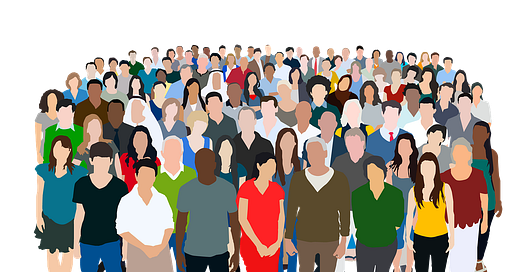We humans are complex organisms, characterized by advanced cognitive abilities, self-awareness, and the capacity for abstract thinking. Humans possess the ability to create, communicate through language, and form deep emotional bonds. But beyond biology, a human is also a conscious entity with the potential for moral reasoning, creativity, and the ability to reflect on their own existence. Individually unfathomable yet collectively predictable within certain constraints. Are we the only animals with this capability? Nobody knows for sure, but it's becoming increasingly likely that we share sentience with other species.
Philosophically, we like to see ourselves as striving for meaning and purpose, grappling with questions about life, death, and the universe. This quest for greater comprehension of our role and context has resulted in the development of cultures, religions, and philosophies that seek to explain our place in the cosmos. Often this knowledge triggers more questions than it answers. And the question most relevant to our times concerns the purpose of human society. Do we have a higher purpose, and if so what might it be?
Obviously this is a multidimensional question. Evolving in time, the possible answers often depend on context. Nevertheless, some propositions remain relevant irrespective of contextual factors. At its core, most people agree that society exists to organize and facilitate cooperation among individuals and groups, allowing them to achieve what is ordinarily impossible to accomplish alone. Through shared intelligence, resources, and mutual support, society provides a structure for the survival, well-being, and flourishing of its members.
Historically, societies have developed systems of governance, laws, and institutions to maintain order, promote justice, and enable progress. Beyond mere survival, human society serves as a platform for cultural expression, scientific advancement, and the pursuit of knowledge. This civilizational model allows, too, for the nurturing of relationships, the transmission of values, and the cultivation of a sense of belonging and identity.
From a broader perspective, the purpose of society could be seen as striving to create conditions that allow for the fulfillment of human potential while ensuring the enduring viability of life on Earth. This involves balancing individual freedoms with collective responsibilities, fostering empathy and cooperation, and addressing challenges such as inequality, environmental degradation, conflict, and the like.
So why are these questions so critical to the future of life on Earth? Appreciating what it means to be human and understanding the purpose(s) of society are crucial because these questions inform our shared worldview, a composite civilisational guide or code of beliefs which manifests as the corporeal world-system of decisions, values, and actions to which we adhere. Decisions, values and actions located outside this shared worldview are considered illegal, irresponsible, or heretical, depending upon context and intent. At the highest logical level it defines what we can and cannot do, and what we consider to be right or wrong. Transactionally it defines how we interact and communicate with each other on a daily basis.
As humanity faces unprecedented challenges - global heating, religious fundamentalism, ideological extremism, technological wizardry, geopolitical tensions, and social inequalities, within a population exceeding 8 billion, the answers to these questions are bound to shape the future of societal evolution.
Margaret Thatcher, influenced by the economist Friedrich Hayek insisted, non-sensically in my opinion, that there is no such thing as society - that there's only individual self-interest. If that is the case and we continue to view humans as just consumers or competitors or citizens, society will go on prioritizing short-term gains at the expense of long-term resilience and collective development. Personal ambition will prevail over collective social structures and we will end up grappling with the same problems that are inflicting us today with no possibility of creating a better world.
But if we see ourselves as stewards of the Earth, an integral element of nature interconnected with the more-than-human world, then the central purpose of society may shift toward creating a harmonious and peaceful environment where all life can thrive.
Ultimately, how we define humanity and the role of the human family will influence how we tackle our most existential challenges, shape our priorities, determine the direction of our collective efforts, and ensure the survival and flourishing of life on Earth (or not) for generations to come.




